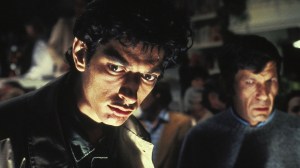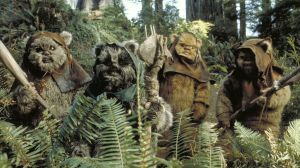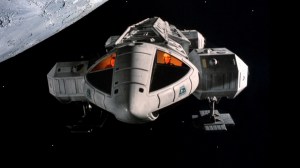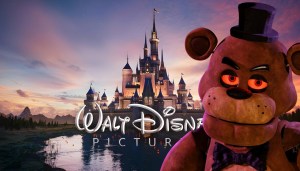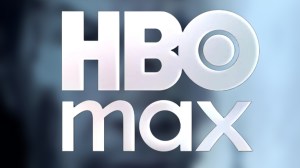Spontaneous arrived on Video on Demand yesterday, bringing an unexpected oasis into this year’s unpredictable roster of new movie releases. The film, which is based on Aaron Starmer’s young-adult novel of the same name, follows Mara (Katherine Langford) and Dylan (Charlie Plummer), two high school seniors whose lives are changed forever after one of their classmates literally explodes into smithereens at school. As Covington High begins to be hit with even more of these inexplicable spontaneous combustions, the students begin to reconcile with the fact that each day could be their last, and Mara and Dylan spark a whirlwind romance in the process.
Videos by ComicBook.com
While the concept of Spontaneous could absolutely come across as macabre in the wrong hands, writer-director Brian Duffield turns the film into something truly special — a comedic, but incredibly hopeful watch, with a profound message about getting through trauma and living every day to its fullest. Duffield has become a notable screenwriter over the past few years, penning The Divergent Series: Insurgent, The Babysitter, Underwater, and the upcoming Love and Monsters. But Spontaneous is undeniably his most impressive and personal work yet, and one that only feels more impactful being released amid the backdrop of the current COVID-19 pandemic.
In celebration of Spontaneous‘ debut, ComicBook.com got a chance to chat with Duffield about all things tied to the movie, and about the bizarre feeling of releasing a pandemic movie during a pandemic. We also talked about the challenge of adapting and expanding on an existing novel, how the film’s explosions were technically pulled off, and his love for The Addams Family. Spoilers for Spontaneous lurk below! Only look if you want to know!

ComicBook.com: Obviously, Spontaneous was filmed years ago, but how does it feel to have it take on this whole new relevancy and meaning after the events of this year?
Brian Duffield: It’s so weird how on the nose the movie feels in a lot of ways. We have the little cartoon PSA in the middle of it, and there was an identical cartoon, complete with the same dialogue and stuff on TV here, in LA about the pandemic and everything. There’s part of me that wants to crawl under the covers. I feel like if this movie came out next year, and was made during COVID, people would really just be like, “It’s too on the nose.” We’re a pandemic movie, during the pandemic. And even the stuff about the quarantine and the tents and everything. It’s funny, I feel like I know so much more about pandemic response stuff now than I did when I made it. That stuff, specifically, feels a lot less sci-fi than it did two years ago. It’s been really weird. That part of it has been kind of hard, where I didn’t really know how – and I still don’t really know how – people are going to respond to it dropping exactly when it’s dropping. Obviously, the world has changed dramatically since we finished even editing it and everything. As you can tell it, it’s kind of this bizarre thing to wrap my head around. I know Utopia on Amazon, which just came out, kind of has the exact same thing, where it’s all about a pandemic. There’s just no way around it. It would feel so different if there wasn’t a pandemic happening.
Even little things — like in the scenes where they’re in the tents goofing around, we had shots of Katherine goofing around, wearing a mask, and we cut it through the normal editing process. I think it was like literally Katherine showing how to appropriately wear a mask. It was just two years ago, dumb kids doing dumb stuff, and then now it’s just like, “Oh God, it would have been so corny.” We’ve been done for a good while, so we’re kind of walking into the world that we’re given, more or less.
I’m just glad that – well, not glad – but we’re not dated enough yet by the politics in the movie. Although I’m really hoping that we will be, and that the anti-Trump stuff becomes a thing of the past, as opposed to “Oh, and we have four more years of this.”
But yeah, I think I’m still wrapping my head around the bizarreness of releasing this movie in the world right now, because it’s really bizarre and unusual. It’s a bummer that we can’t get together with the cast and the crew and enjoy this. Instead, it’s just FaceTimes and texts. There’s the sad part of that too, but hopefully, it is a movie that people can find catharsis in the craziest year in most of our lives.
How did you find the tone of the movie? Because the approach to the more grisly side of it – particularly the explosions – was really well-executed, and I feel like another team would have interpreted them in a more horrific way.
I was hoping you’d say that. A lot of the tone is just Aaron’s book. Acknowledging the difference of reading that a kid explodes, and then having to show a kid explodes, is the challenge. Because in your head, you can make it however you want it to be, so I have to kind of give you the definitive version. That was one of the bigger challenges of the movie. The book opens the exact same way as the movie does, pretty much word for word, and it was really important to me, that audiences right away would know whether or not they could hang with the movie. Because I get, too, the fact that, if you put no flair on it and you’re like, “Hey, this is a movie about kids randomly exploding,” people’s heads can go all the way from Evil Dead to something that’s really sloppy and goofy
It was really important for us to, in that very first shot of the movie, lay out, “This is what you have to expect. It’s not going to be a jump scare. It is going to be bloody. It’s not going to be that gross.” And really find that balance of what feels real enough, to where it feels like something that happened, and it’s something that isn’t as gory that, if you’re a squeamish viewer, you’re not going to turn off the movie 10 seconds in. That was the real visual challenge of the movie, is how do you do this 40 times and not cheapen out that a character is dead? But also you’re trying to make it as enjoyable a movie as possible.
It’s this weird problem — how do you make a child exploding palatable for as wide of an audience as possible? That was kind of the tonal challenge that’s kind of exemplified in the actual combustion, and then the rest of that is kind of how Mara is going through the movie. And having the movie feel like it’s still her point of view, that the interaction with that tone is more how Mara’s character’s tone is, as opposed to what the movie overall is. It was important to us that every time a kid dies, you’re getting either a parent grieving, or a friend grieving or seeing their yearbook photo and you’re kind of like, “That was a real person. I might not have known them well, but it’s not just this frivolous explosion that happens for the lark.”
That was the real tightrope walk, of figuring out how to translate what Aaron did so well in the book onto a screen. Because I really wanted it to be a movie that as wide of an audience that can see an R-rated movie can enjoy, as opposed to just for horror fans or just for high school movie fans kind of thing.
How was it to adapt to the existing novel, without completely doing a one-for-one and copying everything? I would assume that that is a really interesting creative challenge, in and of itself.
I love Aaron, and we have a really fun, great relationship. I still talk to him every day. He was so supportive and on-board. I sent him the first draft and he was like, “Hey, these things that you’re adapting from the book, I think, are hurting the script. Kill that.” He was really the one that was — not giving me permission, but he was like, “We can make a better movie if we move away from the book in certain points.” At the same time, so much of it is just what the book is and does.
I think I just read the book a couple of times through, and I think I read it once with a notepad and jotted down everything, like “I liked this line”, or whatever, and then I just started writing from scratch and never touched the book again. It’s been a while since I read it. People will ask me stuff from the book a lot, and I have no idea. I can’t remember if it was Aaron or myself, but it is like a really fun little marriage that we’ve had.
A lot of it too, he has a bigger scope with the book. I think it’s 350 pages, and you really get a sense of how the world is reacting to this town. It’s the kind of thing we just didn’t really have the finances to show. That was a frustration, where you’re losing some stuff because you can’t afford it. At the same time, it just makes me even more and more laser-focused on Katherine. Instead of cutting away to a news broadcast, and how people are reacting around the world to this one town that this thing’s happening in, you’re so stuck with this 17-year-old girl going on this journey. I think, in hindsight, it helps the movie.
That’s the kind of thing where just that adaptation process, there’s the creative part of it and there’s also the financial part of it, where I’m like, “Oh, I can’t afford to make all of this.” Then you start whittling it away and you’re left with this interesting movie that is really a hybrid of both my voice and Aaron’s voice. There are chunks of it, like that opening scene, that are just word-for-word from the page, because I’m just like, “Well, I’m not going to top it.”
Is there a scene in the movie that, either from a writing standpoint or a directing standpoint, is your favorite? Something where you’re like “Oh my God, I can’t believe that we were able to pull this off?”
There were a couple. I think every time there’s an explosion, I’m extremely proud of it. Obviously, because we’re a lower budget movie we don’t have a lot of time to shoot, so I think we shot for 21 days. Our main thrust of the movie is about kids literally exploding and it’s all practical blood. When you start doing the math, if it goes wrong, we have to reset. A reset is everyone in the shot getting a shower and drying off and then the entire room getting cleaned. It’s an hour turnaround if you had to redo a blood gag. Pretty much every time there’s a blood gag in the movie, it’s the first take and it was just really the cast, crew, everyone just being really on the game and being like, “Hey, if we blow this, scenes are going to get cut from the movie.” I honestly don’t think there was a second take. In the big set-piece, there might’ve been second takes, because there was so much blood that you could get away with continuity errors. But for the most part, it was always the first take of everything.
It’s really hard because one of the things we learned really quickly is when you get hit with the blood gun, it feels really funny. It’s really hard not to have a tension release laugh. All the kids had to come to a warehouse right before shooting and basically practice getting hit repeatedly. We have this amazing actress, Kaitlyn Bernard, who is the girl that gets hit the most in the opening shot of the movie. And we just had to basically rehearse her getting hit multiple times until she was able to be like, “This is the scariest thing that’s ever happened. I’m screaming. I’m doing all these things,” because it’s really hard to perform when you get gallons of warm, sticky Kool-Aid thrown on you. It looks basically like a fire extinguisher that just, instead of foam, it’s just blood. I was so proud of all that stuff, because it just saved our ass, time-wise.
I also think there’s a montage of Katherine in the third act that kind of happened by accident. We were supposed to shoot the swingset scene and the weather was so bad that we just couldn’t shoot it, but we had Katherine for a little bit of time and, on the fly, made that scene. It’s the big close-up of her and everything. That’s one of those lucky accidents where it wasn’t planned, but it’s so beautiful, and Katherine’s performance is so stunning in it. When you’re making a movie, you get bad luck, and sometimes bad luck turns into the best luck. I’m really proud of that.
And I think, on the writing side, Katherine’s cocktail lesson is probably the thing I’m proud of, because it’s such a huge reset of the movie. It’s kind of like the first shot of the movie over again, and it’s almost the exact same score as the opening. It’s telling the audience, “Okay, you’re still in good hands, even though you’re in a radically different movie now.” It was really trying to find a way that you could come back into the movie in a really fun and entertaining way, but still acknowledging the terrible things that have happened and the grief that the characters are going through, in the same kind of scene. That was the hardest nut to crack.
I think once we came up with the cocktail, it felt really good. And having Rob [Huebel] be a part of that too, because he’s so naturally funny, but can also play this very confused, troubled dad, in terms of he doesn’t know what to do in the situation. It becomes a really darkly funny scene. I think for me, that was the thing I stressed out the most about in the creative early stages, just because it was like “How do you have the audience not want to go home right away?” Because they’re just like, “Oh, it’s going to be miserable for the last 20 minutes.” This way, you can be miserable, but we’re going to have fun. We’re not going straight into a war, depressing movie kind of thing.
Just going back to the relevancy of Spontaneous, even outside of the current moment, what do you hope people take away from the film when they watch it?
That’s a great question. I think, for me, what struck me about the book was that… the movie and the book are dark, for sure, but it’s done with a levity about how we’re talking about grief, specifically the grief of when something really unfair and sudden happens out of nowhere. It’s like an earthquake, or whatever that thing is that just upends your life. Obviously, COVID-19 is a perfect example of that.
I think, for me, it was the idea of “What kind of movie would I have needed this movie to be [as a teenager]?” I felt like there weren’t a lot of movies that were necessarily about young people grieving and figuring out how to rebuild themselves. There are definitely movies, like The Fault in our Stars — which I wouldn’t consider a movie about grief, but you’re obviously dealing with loss. But I wanted to make a movie that could be about those bigger universal problems of what happens when this really shitty, unfair thing happens and it totally just derails your whole life.
I remember working on it with Katherine at the start and I told her one of my stories. I worked really hard in college, I moved out to LA, I got a bunch of jobs. I was doing pretty good, and then the recession hit, and I lost all my jobs in a week, and then I was unemployed, no money, in LA in 2008. I got really like bitter and angry because I worked my ass off, I got all these jobs, I did everything right and then this thing happens that really ruins your plans and has nothing to do with you at all. I went through a really bitter stage. And then eventually, you work your way through that and you pick yourself up on your feet and go through that experience. Even going through it, I didn’t really have a movie I could turn to that was like, “They get it.”
I think for me, it was using the combustions as a catchall for whatever that thing is that just knocked the wind out of your sails, whether it’s death, or the economy, or getting laid off. Whatever that is, having a movie that is honest enough to be like, “Yeah, it f-cking sucks, man.” But it’s hopeful enough to be like, “It sucks, but it’s okay that it sucks. And how do we put the pieces back together when there’s not an easy answer?” It’s not like Katherine learns the special catchphrase that makes everything okay. She’s going to be traumatized and scarred for the rest of her life and has to make the choice to accept that and love that about herself and that being a part of her story.
It was the idea of having a movie that, while obviously predominantly aimed at young people, having it be this universal catchall. We’re all going to get broken at some point, and how do we accept that, and keep living, and reclaiming that competence that we had pre-brokenness? Which felt like a really interesting thing to smuggle into a high school rom-com. But that was what was so exciting about it, where we get to be this one movie for a while and then we drastically shift gears, but it’s all the same movie and it’s all about the same things.
That is such a perfect answer. I have a feeling that this movie is going to resonate with people in ways that they definitely weren’t expecting, because that was absolutely the case with me. By the end of it, I didn’t know whether to cry or pump my fist in the air.
I remember talking at length about it with Katherine and being like, “I don’t want it to be a depressing movie.” Obviously, she’d just come out of 13 Reasons Why, which is a lot heavier. I think we’re making the cutest movie about death and grief and you’re going to leave feeling good, or not joking about all that suffering in the middle. It’s been an interesting arc for her to go on, where she has to go through hell, and she doesn’t achieve some kind of goal, she just has to decide to turn the page, basically, and start reclaiming who she was beforehand, but it’s a different version of her.
That’s why the opening shot is the exact same framing as the closing shot, but her reaction was obviously very different. She’s been permanently – both physically and emotionally – changed by this. And she has to figure out, hopefully in not too saccharine of a way, that “Okay, it’s today, and today will become tomorrow. And maybe I’ll explode and maybe I won’t, but this is the story we’re given.”
And now that there’s a pandemic, it feels very unusual. It’s highly reflective of the movie itself, where you’re just kind of like, “Well, here we go. It’s now tomorrow. Please be safe.”
You’ve worked on so many different, interesting projects, both from a writing and a directing standpoint. Is there a franchise that you would love to put your stamp on, that you have not gotten to already?
The answer is yes. But even if I got offered, I would probably say no, if I could keep doing these weird originals. I’m trying to think of a good answer, of something that will definitely never happen. I’m a huge Addams Family nut, and I know they just brought the cartoon back. But if I could, I would totally do an Addams Family prequel of Gomez and Morticia meeting and falling in love. They’re my favorite onscreen folks and they’re such a great couple. I just feel like you give me Oscar Issac and Eva Green, we’d just have a great time just bringing the Addams Family back and making it really spooky and sexy and weird. That’s always the one in the back of my head.
But then again, I really love doing like the stuff like Spontaneous. Even when I did the Insurgent movie — I got hired on that in the first week of them shooting [Divergent], so it wasn’t even a big franchise [at that point]. Once I had that franchise experience, it was really fun to get to see how the giant movies like that get made. But in general, I feel like I’m really happy in this Spontaneous place, where people were just kind of like, “Well, that’s different.” Also, because I love those franchise movies so much — I’ve had buddies that have gone on to direct things that they’ve really loved, franchise-wise, and it’s been a really tough experience. I think I would always worry that, if my Addams Family movie was a really terrible experience, would that ruin two movies that I cherished so much forever to me? Or is it great that I can just always have those movies that I love, and there’s nothing that can happen that will make me not want to put those on?
I love that answer. I would watch the heck out of an Addams Family movie from you. I was actually just rewatching the first ’90s movie this morning, so that is the perfect coincidence.
I’ve brought it up a couple of times because it’s October, and Addams Family and Hocus Pocus kind of get their moment in the sun once a year. But yeah, I’m a huge Addams Family nut. And it’s also — what’s the cool thing to do about it that’s not trying to subvert it? Because they’re so wonderful. But if I had to, I feel like a Gomez and Morticia, bizarro prequel, so you’re not stepping on the classic, but you’re getting what’s so fun about those movies, where it’s these two characters that are just ravenously in love with each other. It’s so fun. You just cast it with the right people, because then you can get away with anything if these characters are just worshiping each other, and then just all kooky Addams goodness around it. It would be fun. But it was also something that I would probably say no to if I ever got asked. It can just be these perfect little gems in my brain.
***
Spontaneous is now available on video on demand.
This interview has been lightly edited for clarity and length.

